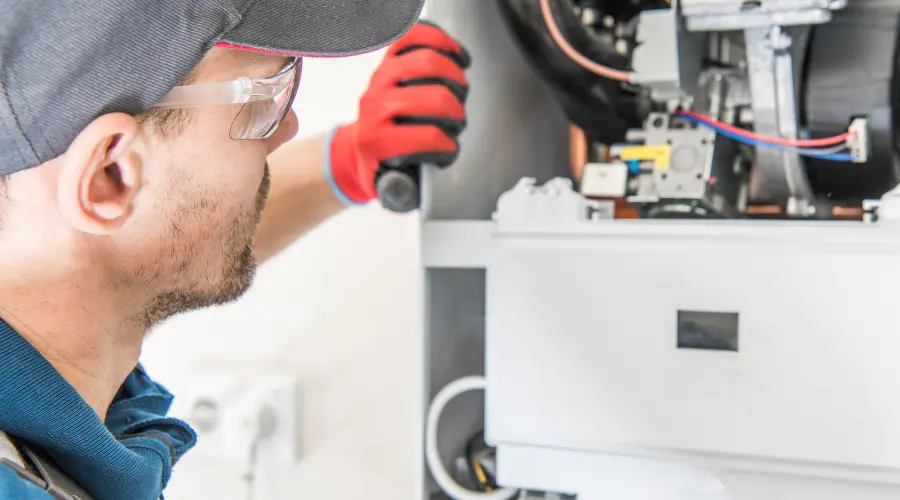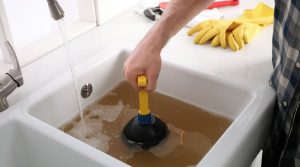Is your shower suddenly ice cold? Strange noises coming from your basement? Water heater costs can range from a simple $150 repair to a $1,200+ replacement. This guide will help you make the right decision and avoid unnecessary expenses.
Signs Your Water Heater Needs Attention
Is your water heater trying to tell you something? Here are the warning signs you shouldn’t ignore:
- No hot water or inadequate supply – The most obvious sign something’s wrong
- Rusty or discolored water – Indicates corrosion inside the tank
- Strange noises – Banging, popping, or rumbling suggests sediment buildup
- Water leaking around the base – Could indicate a serious tank failure
- Visible rust on the exterior – Suggests corrosion issues
- Age over 10 years – Even without symptoms, older units are prime for problems
Pro Tip: Check your water heater’s age by looking at the serial number on the manufacturer’s label. The first letter or number often represents the manufacturing month, and the next two digits represent the year.
Common Water Heater Problems You Can Fix
Before calling a professional, consider these DIY solutions for common water heater issues:
1. Temperature Issues
- Check the thermostat setting – It may have been accidentally turned down
- Inspect the pilot light (gas heaters) – Relight if it’s out following manufacturer instructions
- Test the heating element (electric heaters) – May need replacement if faulty
2. Strange Noises
- Flush the tank – Removes sediment buildup that causes efficiency loss and noise
- Check the pressure relief valve – Replace if it’s making hissing sounds
3. Small Leaks
- Tighten loose connections – Often fixes dripping from pipes or valves
- Replace the temperature and pressure relief valve – If it’s leaking
- Install a leak detector – For early warning of future problems
Safety Warning: Always turn off power or gas to your water heater before attempting any
When Repair Makes Financial Sense
Repairing your water heater is typically the best option when:
- Your unit is less than 7 years old – Most components have several more years of life
- The issue is a single component failure – Such as:
- Thermostat replacement ($150-250)
- Heating element repair ($200-300)
- Pressure relief valve fix ($100-200)
- Anode rod replacement ($150-350)
- No visible rust or corrosion on the tank – Internal structure is likely sound
- Total repair cost is less than 50% of replacement – Industry standard benchmark
According to plumbing professionals, most water heater repairs cost between $150-500, making them significantly more economical than full replacement in many situations.
When to Replace Your Water Heater
Sometimes, replacement is the smarter long-term decision. Consider a new water heater when:
Age Factors
- Tank water heaters over 10 years old – Average lifespan is 8-12 years
- Tankless units over 15 years old – Even these longer-lasting models eventually fail
Condition Red Flags
- Rusty water that doesn’t clear after flushing – Indicates internal tank failure
- Visible corrosion on the tank itself – Structural integrity is compromised
- Frequent or multiple component failures – Suggests systemic issues
Financial Considerations
- Multiple repair calls within one year – Recurring problems indicate decline
- Repair costs exceeding 50% of replacement – Diminishing returns on investment
- Rising energy bills despite maintenance – Efficiency loss can’t be reversed
Real-World Example: A 12-year-old 50-gallon water heater with a leaking tank and failing heating element would cost approximately $450-600 to repair but offers no guarantee against future problems. A new energy-efficient model costs $850-1,200 installed but provides 10+ years of reliable service and lower energy bills.
Cost Comparison: Repair vs. Replacement
| Factor | Repair | Replacement |
| Upfront Cost | $150-500 average | $700-2,000+ installed |
| Longevity | Extends life 1-3 years typically | New 10-15 year lifespan |
| Energy Efficiency | No improvement | Up to 30% more efficient |
| Future Risk | May need additional repairs | Low maintenance for years |
| Home Value | No change | Slight increase |
| Warranty | Parts only (30-90 days) | Full coverage (6-12 years) |
Energy Efficiency Considerations
Modern water heaters offer significant efficiency improvements over older models:
- ENERGY STAR certified models use 10-50% less energy than standard units
- Tankless water heaters can reduce energy costs by 30% compared to conventional models
- Heat pump water heaters use 60% less electricity than traditional electric models
Cost Recovery Calculation: A new high-efficiency water heater might cost $400 more upfront but save $100/year in energy costs, paying for itself in just 4 years.
Professional Assessment vs. DIY Diagnosis
When to DIY
- Simple maintenance tasks like flushing the tank
- Basic component replacements if you’re handy
- Initial troubleshooting to identify problems
When to Call a Pro
- You’re unsure about the root cause of problems
- Water is leaking directly from the tank
- Electrical or gas connections require modification
- You need an expert opinion on repair vs. replacement
Cost-Saving Tip: Many plumbing companies offer free or discounted assessments if you proceed with their recommended service.
Emergency Measures When You Have No Hot Water
When you suddenly have no hot water, try these immediate steps:
- Check circuit breakers (electric) or gas supply (gas models)
- Inspect and reset the high-temperature cutoff button (usually a red button on electric heaters)
- Relight the pilot light following manufacturer instructions (gas models)
- Set your water heater to “vacation” then back to normal – Sometimes resets electronic controls
- Use these temporary solutions while waiting for repair:
- Heat water on the stove for essential needs
- Take advantage of gym showers
- Check if your health club or community center offers day passes with shower access
Make the Smart Decision for Your Home
Deciding between water heater repair and replacement involves balancing upfront costs against long-term benefits. Consider these final recommendations:
- Under 7 years old with minor issues: Repair is usually best
- Over 10 years old with significant problems: Replacement typically offers better value
- Get multiple quotes before making your decision
- Factor in potential energy savings when calculating replacement costs
- Consider the season – if possible, plan replacements during spring/fall when demand is lower
Don’t wait until you have no hot water to make a plan! Preventive maintenance and prompt attention to small problems can extend your water heater’s life and prevent emergencies.
Ready to solve your water heater problems? Contact a certified plumbing professional at CBJ Plumbers – Plumbing Services in NJ today for a thorough assessment and honest recommendations tailored to your specific situation.





